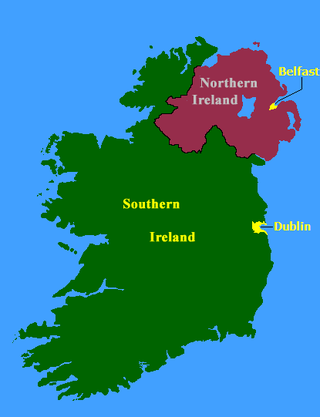
An ethnic conflict is a conflict between two or more ethnic groups. While the source of the conflict may be political, social, economic or religious, the individuals in conflict must expressly fight for their ethnic group's position within society. This criterion differentiates ethnic conflict from other forms of struggle.

The General Framework Agreement for Peace in Bosnia and Herzegovina, also known as the Dayton Agreement or the Dayton Accords, and colloquially known as the Dayton in ex-Yugoslav parlance, is the peace agreement reached at Wright-Patterson Air Force Base near Dayton, Ohio, United States, finalised on 21 November 1995, and formally signed in Paris, on 14 December 1995. These accords put an end to the three-and-a-half-year-long Bosnian War, which was part of the much larger Yugoslav Wars.
Arend d'Angremond Lijphart is a Dutch-American political scientist specializing in comparative politics, elections and voting systems, democratic institutions, and ethnicity and politics. He is Research Professor Emeritus of Political Science at the University of California, San Diego. He is influential for his work on consociational democracy and his contribution to the new Institutionalism in political science.
The National Pact is an unwritten agreement that laid the foundation of Lebanon as a multiconfessional state following negotiations between the Shia, Sunni, and Maronite and Druze leaderships. Erected in the summer of 1943, the National Pact was formed by the then-president Bechara El Khoury and the prime minister Riad Al Solh. Mainly centered around the interests of political elites, the Maronite elite served as a voice for the Christian population of Lebanon while the Sunni elite represented the voice of the Muslim population. The pact also established Lebanon's independence from France.
An ethnocracy is a type of political structure in which the state apparatus is controlled by a dominant ethnic group to further its interests, power, dominance, and resources. Ethnocratic regimes in the modern era typically display a 'thin' democratic façade covering a more profound ethnic structure, in which ethnicity —and not citizenship—is the key to securing power and resources. An ethnocratic society facilitates the ethnicization of the state by the dominant group, through the expansion of control likely accompanied by conflict with minorities or neighbouring states.

Stefan Wolff is a German political scientist. He is a specialist in international security, particularly in the management, settlement and prevention of ethnic conflicts. He is currently Professor of International Security at the University of Birmingham in the United Kingdom. Born in 1969, He studied as an undergraduate at the University of Leipzig and holds a Master's degree from Magdalene College, Cambridge, and a PhD from the London School of Economics, where he studied under the supervision of Brendan O'Leary. His doctoral thesis, dated 2000, was titled Managing disputed territories, external minorities and the stability of conflict settlements: A comparative analysis of six cases.
Ian Steven Lustick is an American political scientist and specialist on the modern history and politics of the Middle East. He currently holds the Bess W. Heyman Chair in the department of Political Sciences at the University of Pennsylvania.
Rupert Taylor, is a professor of political studies and former head of the Department of Political Studies at the University of the Witwatersrand, Johannesburg, from 1987 to 2013. He was educated at the progressive independent Dartington Hall School in England and completed a BA degree in politics and government at the University of Kent in 1980, followed by an MSc at the London School of Economics (1981) and a PhD in sociology at Kent, (1986). He was formerly a visiting research fellow in the Department of Political Science at the New School for Social Research in New York City, adjunct professor in the Department of Political Science at Columbia University and a visiting research fellow in the School of Politics, Queen's University Belfast.
A plural society is defined by Fredrik Barth as a society combining ethnic contrasts: the economic interdependence of those groups, and their ecological specialization. The ecological interdependence, or the lack of competition, between ethnic groups may be based on the different activities in the same region or on long–term occupation of different regions in the Defined by J S Furnivall as a medley of peoples - European, Chinese, Indian and native, who do mix but do not combine. Each group holds by its own religion, its own culture and language, its own ideas and ways. As individuals they meet, but only in the marketplace in buying and selling. There is a plural society, with different sections of the community living side by side, within the same political unit.

The Ohrid Framework Agreement was the peace deal signed by the government of the Republic of Macedonia and representatives of the Albanian minority on 13 August 2001. The agreement was signed by the country's four political parties after international mediators demanded their commitment to its ratification and implementation within a four-year period.

Peacebuilding is an activity that aims to resolve injustice in nonviolent ways and to transform the cultural and structural conditions that generate deadly or destructive conflict. It revolves around developing constructive personal, group, and political relationships across ethnic, religious, class, national, and racial boundaries. The process includes violence prevention; conflict management, resolution, or transformation; and post-conflict reconciliation or trauma healing before, during, and after any given case of violence.
John McGarry, OC is a political scientist from Northern Ireland. He was born in Belfast and grew up in Ballymena, County Antrim. He is currently the Stephen Gyimah Distinguished University Professor in the Department of Political Studies at Queen's University in Kingston, Ontario, Canada.

Brendan O'Leary is an Irish political scientist, who is Lauder Professor of Political Science at the University of Pennsylvania. He was formerly a professor at the London School of Economics. In 2009–10 he was the second Senior Advisor on Power-Sharing in the Standby Team of the Mediation Support Unit of the Department of Political Affairs of the United Nations.
Donald L. Horowitz is James B. Duke Professor of Law and Political Science Emeritus at Duke Law School and Duke University in Durham, North Carolina, United States.
Power sharing is a practice in conflict resolution where multiple groups distribute political, military, or economic power among themselves according to agreed rules. It can refer to any formal framework or informal pact that regulates the distribution of power between divided communities. Since the end of the Cold War, power-sharing systems have become increasingly commonplace in negotiating settlements for armed conflict. Two common theoretical approaches to power sharing are consociationalism and centripetalism.

In politics, a partition is a change of political borders cutting through at least one territory considered a homeland by some community.
Frank Millar is a Northern Irish journalist and former unionist politician.
Pillarisation is the vertical separation of citizens into groups by religion and associated political beliefs. These societies were divided into two or more groups known as pillars. The best-known examples of this have historically occurred in the Netherlands and Belgium.
Centripetalism, sometimes called integrationism, is a form of democratic power sharing for divided societies which aims to encourage the parties towards moderate and compromising policies and to reinforce the center of a divided political spectrum. As a theory, centripetalism developed out of the criticism of consociationalism by Donald L. Horowitz. Both models aim to provide institutional prescriptions for divided societies. While consociationalism aims to give inclusion and representation to each ethnic group, centripetalism aims to depoliticize ethnicity and to encourage the establishment of multi-ethnic parties.
Constructivism presumes that ethnic identities are shapeable and affected by politics. Through this framework, constructivist theories reassesses conventional political science dogmas. Research indicates that institutionalized cleavages and a multiparty system discourage ethnic outbidding and identification with tribal, localized groups. In addition, constructivism questions the widespread belief that ethnicity inherently inhibits national, macro-scale identification. To prove this point, constructivist findings suggest that modernization, language consolidation, and border-drawing, weakened the tendency to identify with micro-scale identity categories. One manifestation of ethnic politics gone awry, ethnic violence, is itself not seen as necessarily ethnic, since it attains its ethnic meaning as a conflict progresses.







